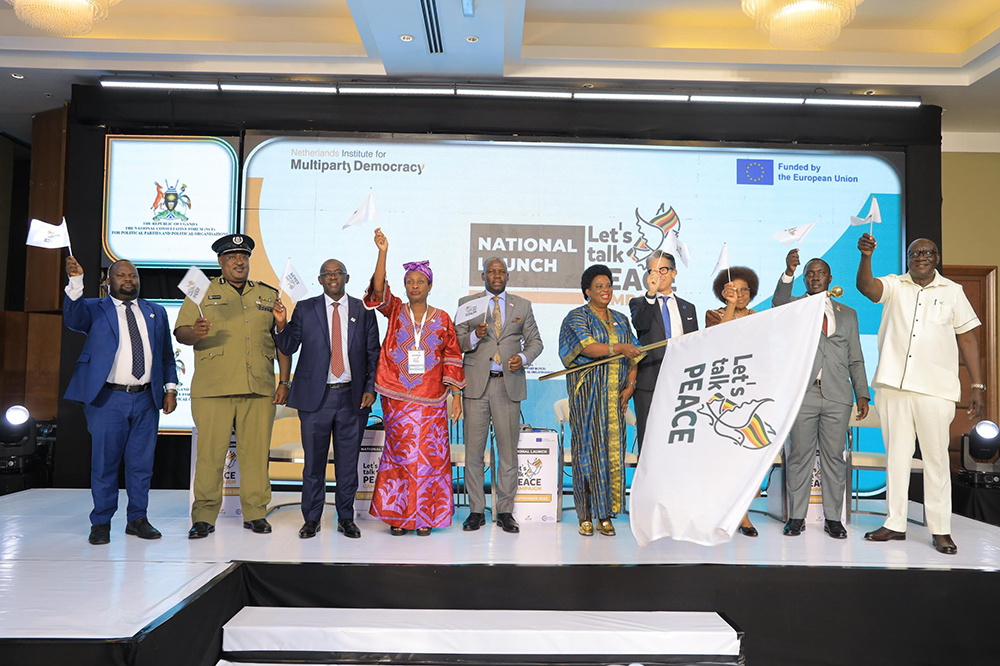Gender minister Amongi urges youth engagement, media safety in peace drive
“These are the groups most susceptible to recruitment into conflict. Any peace initiative that overlooks the youth is unlikely to succeed,” Amongi said, emphasising the need for youth-centred strategies in promoting peaceful elections.
Gender Minister Betty Amongi speaking at the launch of the Let’s Talk Peace campaign at the Sheraton Kampala Hotel on September 18, 2025. (Courtesy photos)
________________
Gender Minister Betty Amongi has warned that unemployed youth remain the most vulnerable group targeted for election-related violence, urging proactive peace measures ahead of the polls.
Speaking at the launch of the Let’s Talk Peace campaign at the Sheraton Kampala Hotel on September 18, 2025, Amongi highlighted that clashes during past campaigns are often fuelled by jobless young people who are manipulated by political actors.
“These are the groups most susceptible to recruitment into conflict. Any peace initiative that overlooks the youth is unlikely to succeed,” Amongi said, emphasising the need for youth-centred strategies in promoting peaceful elections.
The campaign, spearheaded by the Netherlands Institute for Multiparty Democracy (NIMD), will traverse major electoral hotspots, foster dialogue and reduce political tensions.
However, Amongi advised organisers to collaborate closely with security agencies, political parties, and community leaders to educate young people on non-violent participation in politics.
She further stressed the role of state security forces, often criticised for heavy-handedness, as key “gatekeepers” in preventing election-related violence.
Religious and cultural leaders, she said, must also help calm ethnic and faith-based tensions.
“The initiative should involve the Justice Ministry, Defence, and Internal Affairs to harmonise efforts and establish a communication mechanism that ensures people’s protection during election periods,” Amongi added.
Journalists’ safety
Amongi also called for the protection of journalists and transparency from electoral officials, noting that a peaceful election depends on voters having access to information without intimidation or censorship.
“I’ve called for the media to be safeguarded during elections. A peaceful election allows all stakeholders to participate without fear, including the press,” she said.
She further emphasised that access to diverse political perspectives is essential.

“If the public cannot access all manifestos and the media is dominated by one side, then that cannot be considered a peaceful election. Political actors must lead by example, discouraging violence and championing dialogue,” she added.
Security's role
Uganda Police Force director of operations Frank Mwesigwa, reiterated the role of security in facilitating credible elections.
“Democracy can’t happen without security. We are collaborating with all stakeholders to ensure elections proceed smoothly,” he said.
A people-centred election
Electoral Commission chairperson Justice Simon Mugenyi Byabakama urged stakeholders to prioritise citizens in the electoral process.
“Let pessimism not define our approach. There is so much to be proud of in Uganda, and elections should focus on the interests of the people rather than the shortcomings of the system,” Byabakama said.
Byabakama noted that elections should focus on the interests of the people rather than being defined by the shortcomings of the electoral system. He called on everyone to ensure that citizens remain the “lowest common denominator” in campaigns, politics, and electoral processes.
He also highlighted the importance of safeguarding public safety, stressing that while Uganda is capable of holding free and fair elections, it requires the active contribution of all stakeholders.
Promoting peace
John Osapiri, Manager of Legal Policy Advocacy, Partnerships, and EAC Affairs at the Inter-Religious Council of Uganda (IRCU), outlined the council’s efforts to foster peaceful elections.
These include the National Mobilisation for Peaceful Elections, which encourages citizens and community leaders to actively promote peace.
“Peace is a collective effort, and we aim to expand these discussions to districts, involving youth, religious, and cultural leaders,” Osapiri said.
He condemned unlawful arrests and human rights violations, stressing that proper legal procedures must be followed in political disputes.
“Arbitrary arrests and torture have no place in democracy. Everyone must respect the law and human rights during this period,” he added.
At the close of the event, delegates proposed a weekly National Peace Day, ideally on Wednesdays, where citizens would wear white to symbolise peace.
Beatrice Kiraso, the former EAC deputy general secretary, said interfaith prayers and a national peace conference would precede the presidential debates to further solidify dialogue and unity.
The Let’s Talk Peace campaign reflects a growing recognition that Uganda’s next elections require inclusive participation, protection of vulnerable groups, and a concerted push to safeguard the rights of citizens and the media alike.